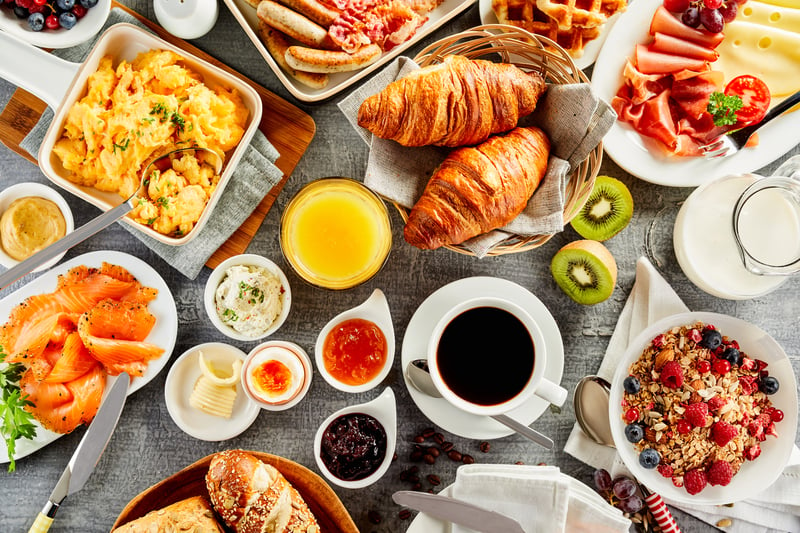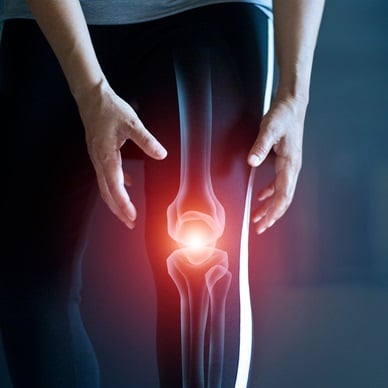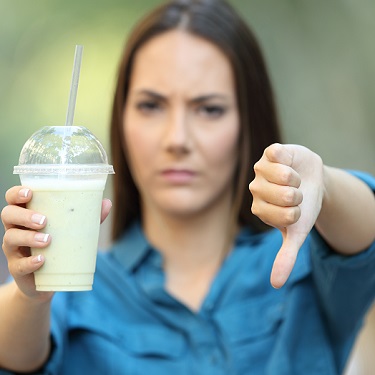When Should You Eat Your Biggest Meal of the Day?

There’s so much information on how we “should” eat. We hear recommendations on what to eat, how to eat, and even when to eat to lose weight, gain energy, or feel our best. Often, the answers boil down to good basic advice, such as eating more whole foods, especially vegetables and quality proteins, eating more mindfully, and honoring hunger cues. All of which are simple, effective, and almost universal recommendations. But when it comes to when should you eat your biggest meal, there’s a bit more debate.
Some experts, for instance, suggest we should front load and eat a bigger breakfast. You’ve probably heard the saying, “Eat breakfast like a king, lunch like a prince, and dinner like a pauper.” Yet other research suggests that when it comes to losing weight, when you eat the biggest meal makes little difference. It just comes down to calories in versus calories out.
Chrono-Nutrition: Understanding the Science
Nearly every cell in the body follows a 24-hour cycle governed by the circadian clock. This clock regulates our bodies’ daily rhythms, functions, and even metabolism. When you combine the study of how we eat with the circadian rhythm, it’s called “chrono-nutrition.” Chrono-nutrition uses external time indicators, such as:
- Light-dark cycles
- How food intake timing affects eating patterns
- How food intake timing affects metabolic health, such as the balance of blood sugar and insulin response
- And even how eating may shift the body’s clock. 1
To better understand how food timing affects metabolic health, in 2013, researchers took two groups of overweight and obese women who also had metabolic syndrome. The women were randomized into two groups. Both were given the same number of daily calories (~1,400 per day) to lose weight. One group got a larger breakfast (700 calories) and a smaller dinner (200 calories). The other group got a smaller breakfast (200 calories) and a larger dinner (700 calories). Both groups ate a 500-calorie lunch.
At the end of the 12-week study, the big breakfast eaters enjoyed greater weight loss as well as a larger decrease in waist circumference. While both groups experienced a decrease in fasting glucose, insulin, and ghrelin (the hunger hormone) levels, the big breakfast eaters saw a bigger positive result. And when it came to triglyceride levels, those who ate the big breakfast experienced a decrease of over 30%, whereas those who ate the bigger dinner saw their triglycerides increase by almost 15%. Finally, those who front-loaded their daily meals with the big breakfast felt fuller throughout the day. 2
Another study from 2013 also examined the role of food timing and its effects on weight loss over 20 weeks. The participants were separated into early lunch eaters (51%) and late lunch eaters (49%). The researchers examined their energy intake vs. expenditure, appetite hormones, genotype, chronotype, and more.
In this study, the researchers found that those who ate the later lunch lost less weight and experienced slower weight-loss results than those who ate earlier in the day, even though the amount consumed, composition of the meals, and energy expenditure were similar for both groups.
The researchers did note that those who were late lunch eaters tended to have smaller breakfasts or skip breakfast altogether more often. The conclusion of this small study was that eating late may negatively affect weight loss and that timing of meals does matter. 3
Before we get too far, though, new research found that while a smaller or bigger breakfast or dinner can affect appetite, it doesn’t appear to affect metabolism or weight loss. In this randomized crossover trial, 30 obese or overweight adults went on a calorie-restricted diet. During 2 weeks of the study, they followed a morning-loaded diet (45%, 35%, 20%), and the other 2 weeks, they ate the reverse (20%, 35%, and 45%) at breakfast, lunch, and dinner, respectively.
These researchers found no differences in terms of energy expenditure or resting metabolic rate. And there was no difference in weight loss. That said, those who ate more in the morning reported feeling significantly less hungry during the day, which could make it easier to stick to a calorie-restricted plan. 4
Does Fasting Make a Difference?
Another small study examined early time-restricted feedings and a control schedule where the participants were able to eat from 8 a.m. to 8 p.m. After the four-day experiment, the volunteers were measured by whole-room calorimetry to examine energy expenditure and substrate oxidation.
Interestingly, the time-restricted feeding did not affect how many calories were burned. However, it actually decreased levels of ghrelin, so hunger was steadier throughout the day, and the participants who restricted when they ate tended to feel fuller and had less desire to eat. It also increased metabolic flexibility. So, in this small study, time-restricted feedings were shown to improve weight loss by decreasing appetite and improving fat burning rather than increasing metabolism. 5
Is there any difference when breakfast is skipped versus dinner? Another study looked at skipping meals and their effects on energy balance, metabolism, and inflammatory responses. Again, researchers took a small number of volunteers (17) in a randomized controlled crossover trial. They all ate the same number of calories in the 24-four period with 55% carbohydrates, 30% fat, and 15% protein. There was a control period where they followed a conventional three-meal-a-day diet. And then they also either skipped breakfast or skipped dinner.
Whether dinner or breakfast was skipped, 24-hour energy expenditure was increased. However, only when breakfast was skipped did fat burning also increase. But skipping breakfast also led to increases in insulin levels after lunch, suggesting that skipping breakfast could lead to metabolic inflexibility as well as increased levels of inflammation, which could have negative effects on long-term weight loss. 6
One reason for the high variability between studies could be due to the length of the overall study. It may take over four weeks for the body to adjust and reach a new homeostasis. So, longer studies (12+ weeks) may be needed to help understand the full picture.
That said, there’s one very important meal that these studies overlooked. And honestly, in our fast-paced world, a lot of us may overlook it as well—to our own disadvantage.
The Forgotten Meal: Lunch
With all the focus on (especially) breakfast, many of us have a light breakfast (if we eat it at all) and then have a big, heavy meal for dinner.
Lunch, on the other hand, tends to be an afterthought. Typically, we just grab something quickly, often while we continue to work (guilty!). Yet once upon a time, we often stopped for lunch, which was regularly the biggest meal of the day. For instance, people who worked the land tended to get up in the morning and eat a relatively light breakfast before starting their daily chores. After working hard all morning, they were famished and ready to sit down for a big meal midday. So, they would head home (or to the big house or ranch) for lunch (called dinner) to energize them for their hard work in the afternoon. Then, before bed, they’d eat a light supper before starting the whole routine again the next day. 7
Various cultures continue to eat this way. For example, in Spain and other European countries, it’s still common to have a larger midday meal, typically followed by an afternoon rest or siesta, and ended with evening tapas (small plates of food).
Ah… how times have changed for perhaps too many of us, especially in fast-paced societies like the U.S. Now, we often work far from our homes, with little time to prepare a meal, especially lunch. At best, we may fill a Mason jar with a big salad or grab a quick sandwich to eat over a keyboard, while driving, or for a few minutes in a breakroom.
This fast-paced, low-cal fair could be working against us. New research suggests that eating the bulk of our calories at lunch may just be the Goldilocks solution we’ve been looking for when it comes to losing weight and feeling our best.
In one 12-week study, for example, 80 overweight or obese women (ages 18 to 45) ate their biggest meal of the day (50% of calories) for either lunch or dinner. The rest of the calorie allotment broke down to 15% for breakfast, 15% for a snack, and 20% for either lunch or dinner (depending on your group). So, for example, if you were following an 1,800-calorie diet (adjusted up or down for your basil metabolic rate or BMR), you would eat ~ 270 calories at breakfast, ~270 calories for a daily snack, and 900 calories at lunch (that’s quite a big meal!) and 360 calories for dinner (or vice versa, with 900 calories at dinner and 360 calories at lunch). 8
The researchers also provided guidelines for the types of foods to eat. In this study, the diet consisted of 17% protein, 23% fat, and 60% carbs, with 400 grams coming from nutrient- and fiber-dense vegetables and fruits. Finally, the participants were moderately active—walking briskly (or similar) for an hour five days per week.
At the end of the study, those who ate a big lunch enjoyed a higher average weight loss (around 13.2 pounds vs. 9.9 lbs) and a bigger drop in BMI (body mass index). In addition, those who ate the bigger lunch experienced lower fasting insulin levels, which translates to more steady blood sugar levels and decreased hunger levels.
This isn’t the only study showing positive results for eating a bigger midday meal. At least two other studies have found that eating more of your daily calorie intake at lunch is associated with a lower risk of being overweight or obese. 9, 10 This includes a Spanish study that found overweight women who had a larger lunchtime meal lost more weight than those who ate more calories at their evening meal.
While loading up your plate with starchy carbohydrates or empty calories may lead to afternoon fatigue, eating a big plate of vegetables, quality proteins, and healthy fats can energize you and even help you bypass that afternoon slump altogether!
In other words, lunch isn’t an obstacle that interrupts the flow of the day. Instead, it’s an event to look forward to to help us recenter and refuel for a healthy, productive afternoon.
What’s more, eating carbohydrates at lunch gives our bodies a greater opportunity to burn those calories, making it easier to regulate blood sugar levels. Finally, a bigger lunch tends to make it easier to enjoy a lighter, nutrient-dense dinner, which can lead to improved sleep.
Healthy Lunch Ideas
For many of us, it can be difficult to prepare a big lunch. After all, we’re either far from home or have to battle with meetings, deadlines, and other demands in the middle of the day. Fortunately, there are a lot of great lunch ideas that take little prep time or that can be made in advance, such as:
- Hearty soups and stews
- Curries
- One-pot meals
- Ramen Bowls
- Rice Bowls
- And other Bowl Recipes
When Should You Eat Your Biggest Meal?
Remember, however, that the results of these studies were from overweight people who were eating at a calorie deficit. Your results may differ, depending on your weight and goals. Plus, other changes could make a difference. For instance,
- Eating higher protein meals and snacks can help you feel fuller for longer. They also may trigger a dopamine release, the hormone associated with reward or motivation. This may, in turn, help reduce food cravings and mindless snacking. 11, 12
- Eating earlier in the day may help boost exercise performance and increase activity levels, as a heavier meal later in the day may weigh you down. 13, 14
Of course, all of us are different. How we respond to nutrient timing may depend on our personal preferences and biological differences (or chronotype). Allow yourself to be your own researcher and find what works best for you, your energy levels, and your weight-loss results.
If you find a big breakfast weighs you down, choose a smaller one or even hold off on eating until later in the morning or early afternoon. Likewise, if you find a big dinner leads to discomfort and a more difficult time falling asleep, lighter fare may be better for you. Again, if you find you don’t sleep well if dinner is too sparse, go ahead and enjoy a larger meal. Lastly, don’t overlook lunch—like the study participants, that may be when you should eat your biggest meal to fuel your tank and help you reach your weight-loss goals.






 US Doctor: "Eating This Every Day Can Snap You Into Ketosis"
US Doctor: "Eating This Every Day Can Snap You Into Ketosis" 3 Key Nutrients to Help Lubricate Your "Tin Man" Joints
3 Key Nutrients to Help Lubricate Your "Tin Man" Joints AVOID Plant-Based Protein Powders (unless...)
AVOID Plant-Based Protein Powders (unless...)

